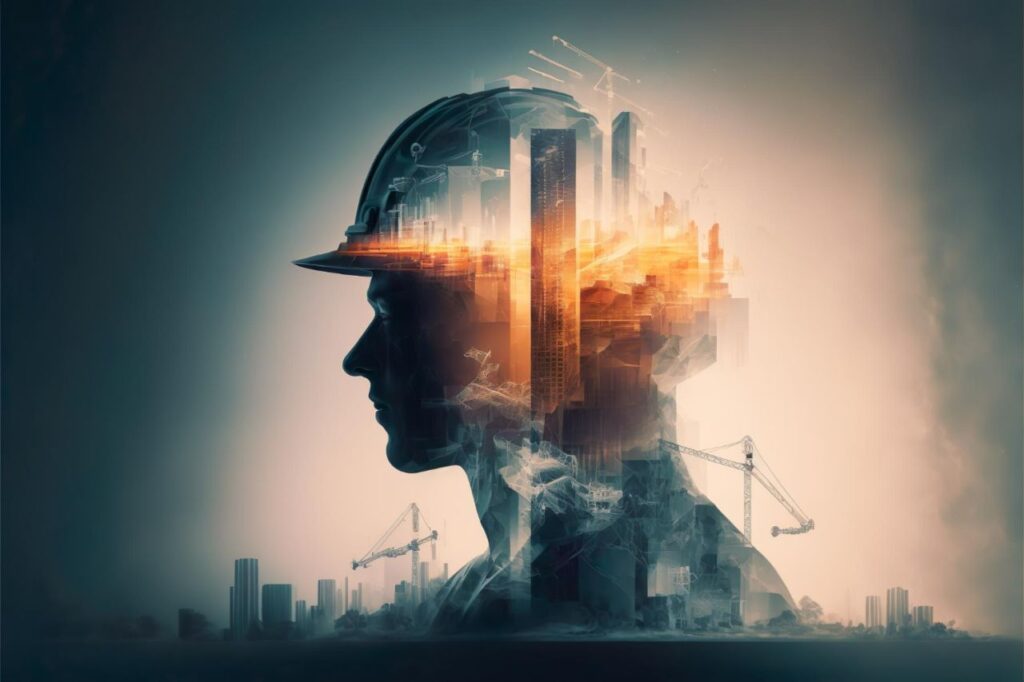Blueprints to Bots: The Unseen AI Revolution in Construction
For many, the mention of artificial intelligence (AI) or machine learning conjures images far removed from human interaction, often leading to concerns about a lack of human element in these technologies.
Yet, the fascination with AI-driven tools like ChatGPT and virtual assistants such as Siri and Alexa reflects their profound impact on various industries. The construction sector, notably lagging in digital adoption, stands to gain significantly from integrating AI. The use of AI in construction promises to increase efficiency, enhance quality, bolster performance, and improve safety at job sites.
A McKinsey study highlights that the construction industry, contributing over $10 trillion annually and accounting for 13% of the global GDP, could see a market capitalization increase of about $1.6 trillion annually through digitization. This positions construction as one of the most substantial sectors in the global economy.
The Necessity of AI in the Construction Industry
The construction industry has seen a significant uptick in technology and digital collaboration recently. However, balancing the introduction of new tech while maintaining project momentum remains a challenge.
This is where artificial intelligence and machine learning come into play. These advancements are set to drive substantial progress in the construction sector, benefiting workers, contractors, and clients alike.
AI’s application in construction management significantly bolsters safety, speed, accuracy, and overall operational efficiency. AI-powered solutions in construction enable proactive monitoring of job sites, identifying and addressing potential hazards to avert accidents. Machine learning’s capability to sift through extensive data helps refine designs for better energy efficiency and cost-effectiveness. Additionally, the use of robotics process automation (RPA) in construction can notably enhance the speed and quality of construction projects.
Grasping AI, Machine Learning, and Deep Learning in Construction
In the construction industry, the terms AI, machine learning, and deep learning are more than just buzzwords; they represent layers of technological evolution each with its unique role. AI in construction is the overarching concept, encompassing any computer system that performs tasks normally requiring human intelligence. This includes problem-solving, learning from past experiences, and adjusting to new inputs – crucial in a field where unpredictability is the only constant.
Machine learning is a subset of AI, specifically focusing on the idea that systems can learn from data, identify patterns, and make decisions with minimal human intervention. In construction, this translates to analyzing project data, learning from past project outcomes, and applying these insights to make smarter decisions on future projects. For instance, machine learning algorithms can predict project delays or budget overruns by analyzing historical data, weather patterns, and resource availability.
Deep learning takes machine learning a step further. It’s a type of machine learning inspired by the structure of the human brain, using layers of algorithms known as neural networks. In construction, deep learning can process and interpret vast amounts of unstructured data, like images from construction sites, to identify safety hazards or assess progress. It’s like having an extra set of eyes that never tire, constantly analyzing visual data to enhance safety and efficiency on site.
These technologies are not just fancy add-ons in the construction sector; they are becoming integral to solving some of the industry’s most complex problems. From predictive analytics to real-time decision-making, AI, machine learning, and deep learning are reshaping how we approach construction projects, making them safer, more efficient, and more predictable.
Eight Key Benefits of AI in Modern Construction
AI has become an indispensable element in today’s engineering and construction sector. It addresses major industry challenges such as managing costs, ensuring safety, and avoiding project delays. Throughout the lifecycle of a construction project, from the initial stages, design, and bidding, to financing, logistics, operations, and even asset management, AI plays a pivotal role in enhancing efficiency and effectiveness.
Streamlining Land Surveys
Efficient land surveying is achievable through a significant reduction in time spent on detailed land surveys and capturing aerial images for improved project management. Drones, Geospatial Information Systems (GIS), and Geospatial AI (GeoAI) play a crucial role in monitoring project advancements and identifying issues at the construction site.
Enhancing the Quality of Design
The advantages of AI in design extend beyond the initial stages. Machine learning steps in to assist workers in detecting potential mistakes and omissions within the design before moving forward with construction. Instead of dedicating hours to error-spotting, machine learning takes the reins, saving time and releasing resources for more meaningful tasks.
When equipped with the appropriate AI technology, you can also explore different environmental conditions and scenarios within the model. This technology proves invaluable in assessing the optimality of specific design elements and predicting potential issues that may arise in the future.
Increase Safety
Boosting safety on construction sites is a top priority, and AI introduces a cutting-edge approach to achieve this objective.
AI-driven computer vision takes center stage, analyzing trip and fall incidents to inform enhanced safety measures for workers. It goes beyond, scrutinizing video footage to pinpoint safety hazards and non-compliance issues. Picture this: if team members aren’t donning their protective gear correctly, AI steps in, signaling managers to conduct necessary safety training.
But wait, there’s more. AI transforms incident reporting into a streamlined process. With sensors, cameras, and IoT devices strategically placed on-site, real-time data collection keeps a watchful eye on any unfolding incidents. Additionally, AI plays a role in empowering workers to identify and report incidents. Through natural language processing (NLP), AI-powered systems scrutinize reports, identify patterns, and recommend appropriate courses of action. In the realm of construction safety, AI is the high-tech ally that’s rewriting the rules.
Effortless Project Management with AI Automation
Say goodbye to the manual grind of project management in construction.
The traditional approach, laden with tedium, time consumption, and the constant risk of errors, is now a thing of the past. With the infusion of AI, construction project management undergoes a seamless automation makeover, efficiently handling mundane tasks. This not only minimizes errors but also liberates precious time and resources.
AI’s automation prowess extends to task delegation, leveraging employee data to optimize workflows. This strategic automation allows workers to focus on their specialized areas, resulting in a significant boost to overall productivity. Construction project management, redefined by AI, is all about working smarter, not harder.
AI Accelerates Construction Takeoff and Cost Estimation

Streamlining the bid-winning process often stumbles at the sluggish pace of manual takeoffs, dragging on for weeks and susceptible to human errors that jeopardize cost estimates. Enter AI, transforming the game by automating repetitive tasks and slashing the takeoff timeline to under a minute, boasting an impressive 98% accuracy rate.
Transforming Jobsite for Enhanced Productivity
AI is revolutionizing jobsites, and enhancing productivity through the introduction of self-driving construction machinery. Companies are pioneering the use of autonomous equipment for repetitive tasks like concrete pouring, bricklaying, welding, and demolition, surpassing human efficiency.
Bulldozers, operating autonomously or semi-autonomously, handle excavation and prep work with precision, following exact specifications programmed by humans. This strategic integration allows human workers to focus on core construction tasks, significantly reducing project completion time. Real-time monitoring by project managers is facilitated through facial recognition, onsite cameras, and similar technologies, providing insights into worker productivity and adherence to procedures. The synergy of AI and construction is paving the way for more streamlined and efficient job sites.
AI Alleviates Labor Shortages: Revolutionizing Construction Productivity
In response to labor shortages and a quest to elevate the construction industry’s productivity, firms are increasingly investing in AI and data science. According to a 2017 McKinsey report, real-time data analysis through AI could potentially boost productivity in construction by up to 50 percent. Construction companies are now leveraging AI and machine learning to optimize the distribution of labor and machinery across various job sites.
Enter the era of AI-powered robots, exemplified by Spot the Dog, which revolutionizes project management. These robots continuously evaluate job progress, monitor worker and equipment locations, and provide instant insights to project managers. This allows for on-the-spot decisions about whether a job site has adequate resources to meet deadlines or if additional labor needs to be deployed.
Notably, an AI-powered robot like Spot the Dog autonomously scans a job site every night, enabling large contractors to maximize productivity, especially in remote areas where skilled labor is scarce.
Optimization of Equipment and Asset Management
Effective equipment and asset management play pivotal roles in successful construction projects. AI steps in as a game-changer by optimizing equipment usage and maintenance through predictive analytics.
This innovative approach anticipates potential failures, enabling the scheduling of preventive maintenance to minimize downtime and reduce costly repairs.
Furthermore, AI excels in optimizing equipment deployment and resource allocation, ensuring that the right tools are readily available at the right time. The result is a more streamlined and efficient construction process, where AI’s predictive prowess enhances overall project performance and cost-effectiveness.
Conclusion
The integration of Artificial Intelligence (AI) in the construction industry marks a transformative leap toward efficiency, safety, and productivity. From automating mundane tasks to revolutionizing project management, AI is reshaping traditional practices.
The benefits are evident in streamlined construction processes, reduced downtime, and enhanced decision-making. AI’s predictive capabilities not only optimize equipment and asset management but also address labor shortages, showcasing its potential to overcome industry challenges. As construction firms increasingly invest in AI and data science, the future promises a more agile, productive, and technologically advanced construction landscape.
The synergy between AI and construction is not just a trend; it is a strategic evolution that holds the key to a smarter and more sustainable future for the industry.


Leave a Reply